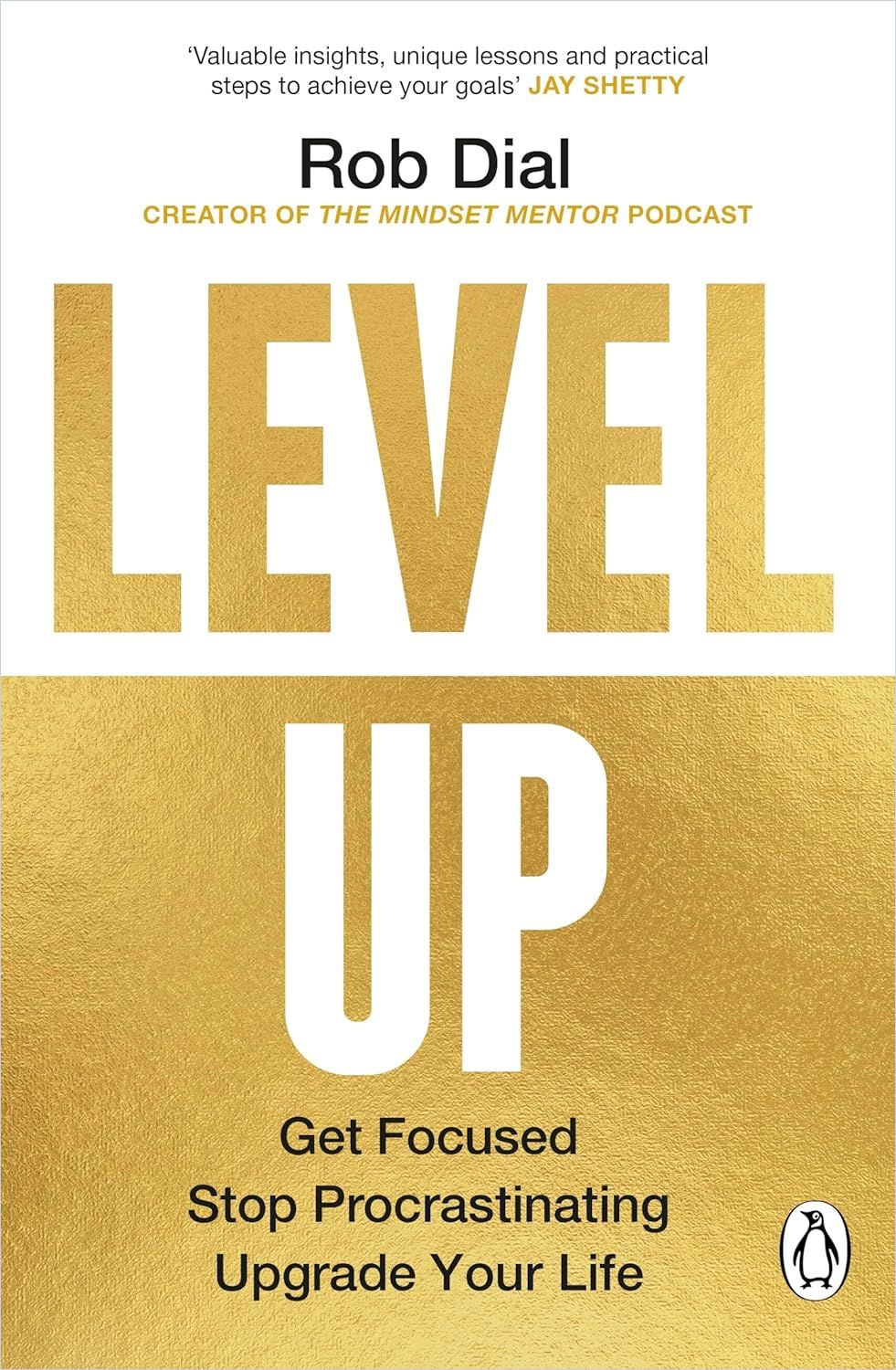Do the hard work now and achieve your goals, or don’t and deal with the fallout. The choice is yours. High-performance coach Rob Dial lays out a practical, science-backed system for overcoming fear, building momentum, and creating lasting change.

Blueprint for a Breakthrough
Personal growth is a powerful, meaningful pursuit, but myriad obstacles stand in the way — some due to human nature’s resistance, some stemming from each person’s unique personality and experiences. Hence, the thousands of books, podcasts, systems, and coaches that all seem to say pretty much the same thing. Yet growth-seekers pore over them, seeking the exact key they need to release their particular lock.
High-performance coach, author, speaker, and entrepreneur Rob Dial is a leading source of these keys, which he offers through his popular podcast The Mindset Mentor, keynote speeches, and articles in major media outlets including Forbes and Inc. magazines. In Level Up, Dial’s first book, he assembles cutting-edge research, practical tools, and wisdom from high performers into a unified system for beating procrastination and bringing your goals within reach.
Fear: Great for Neanderthals, Bad for Goals
Dial divides his book into three sections. First, he pinpoints the reasons people resist action. Second, he offers solid guidance for overcoming those obstacles and taking action. And third, Dial addresses the importance of consistency and habits in long-term success.
For Dial, the obstacles to achievement all boil down to fear: fear of failure, fear of rejection, fear of success, fear of feeling fraudulent, and fear of abandonment. All of these fears, he says, tie in to the underlying, subconscious worry that you won’t measure up, and therefore don’t deserve love.
Fear is letting you know that you have reached the edge of your comfort zone. It’s a sign of what you need to push past so you can grow.Rob Dial
The good news, Dial says, is that fear isn’t rational. Fear has its roots in humanity’s distant past, as a tool for self-preservation in a primal environment. But today, the brain conjures fear even when no threat exists. Dial cites a Cornell study showing that some 97% of all worries never manifest.
Having dispelled fear as the major limiting factor in achievement, Dial offers powerful strategies for moving past inertia — productivity hacks with deep meaning and impact. For example, he advises readers to shift their sense of identity from a person who doesn’t accomplish much to one who actively pursues dreams. Escape your rut, he urges. Choose who you want to be, and then behave the way that person would.
Tiny Steps, Big Mojo
When it comes to execution, taking the first steps toward reaching your long-term goal can be daunting, Dial admits. So instead of focusing on the end goal, he says, concentrate on the next step, and build momentum by taking daily bite-sized “micro-actions.” Respect the power of small decisions, he urges, as even baby steps will eventually get you to your goal. Every decision you make will either set you on a favorable course or take you backward.
For most of us, the nemesis of action is distraction. Dial offers simple but impactful tactics to thwart distractions, such as putting your phone in another room or in a drawer while you work, deleting apps, and turning off notifications. Distractions are abundant at home, too. Remember, cautions Dial, family is likely a primary reason you want to fulfill your dreams, so don’t use your kids as an excuse to abandon your goals. Hire a babysitter or a nanny if you need to, he says.
If it doesn’t challenge you, it doesn’t change you.Rob Dial
High-level performance requires energy, so Dial recommends tracking your energy levels throughout the day so you can schedule tasks accordingly, establishing a morning routine to jumpstart the day, and prioritizing your highest-impact tasks. He also emphasizes the importance of sleep. Other tips include soaking up the morning sunlight, staying hydrated, and experimenting with intermittent fasting to see if it gives you a boost.
Get Addicted to Progress
In the long run, Dial says, success comes down to consistency. He recommends noticing the micro-actions that boost your productivity and turning them into habits you do on autopilot. Identify “keystone habits,” a term borrowed from Charles Duhigg’s self-help guide The Power of Habit, which have the potential to create broad improvements in your life, often facilitating other habits. Select one keystone habit to implement first — getting out of bed an hour earlier, for example — and do it for 100 consecutive days. Use your newfound time in the mornings to build other positive habits, such as journaling, reading, or exercising. Once you have habituated your first keystone habit, repeat the process.
Moreover, increase your discipline so you’ll be more likely to follow through on decisions and commitments, avers Dial. Discipline has two facets: “doing what you say you will do” and “doing what you need to do, even when you don’t want to do it.” To train yourself to become more disciplined, Dial recommends committing to completing a small job, such as washing just one dish. You’ll usually end up doing them all. If you can build discipline while doing a job you don’t like, it will come easily with tasks you enjoy.
Huge rewards and radical change come from small, smart choices made consistently over time.Rob Dial
Dial offers a wealth of ideas to support productivity, some familiar (for example, get enough sleep) and some fresh (for instance, push through the discomfort of learning something new so your brain releases acetylcholine and epinephrine, triggering neuroplasticity). Primarily, he suggests, focus on focus. Apply the Pomodoro Technique, which, according to Dial, could double your productivity: Using a timer, work without distractions in 25-minute spurts followed by five-minute breaks.
Moreover, use dopamine as a lever, Dial suggests. Dopamine is addictive, and it energizes you. Reward yourself for achieving small, action-based goals rather than waiting until you accomplish your ultimate goal to give yourself that boost. Eating a small piece of chocolate or watching a funny video can be especially powerful rewards, Dial notes, because both release dopamine. As you establish new behaviors, habits, and routines, the dopamine hits won’t be as potent, but you will have established new patterns that will help you achieve your larger aims.
Ultimately, personal growth isn’t about heroic leaps; it’s about small, intentional moves made daily, with courage and consistency. Dial reminds us that the life we dream of doesn’t manifest in one fell swoop; it’s built, piece by piece, through habits, focus, and perseverance.












